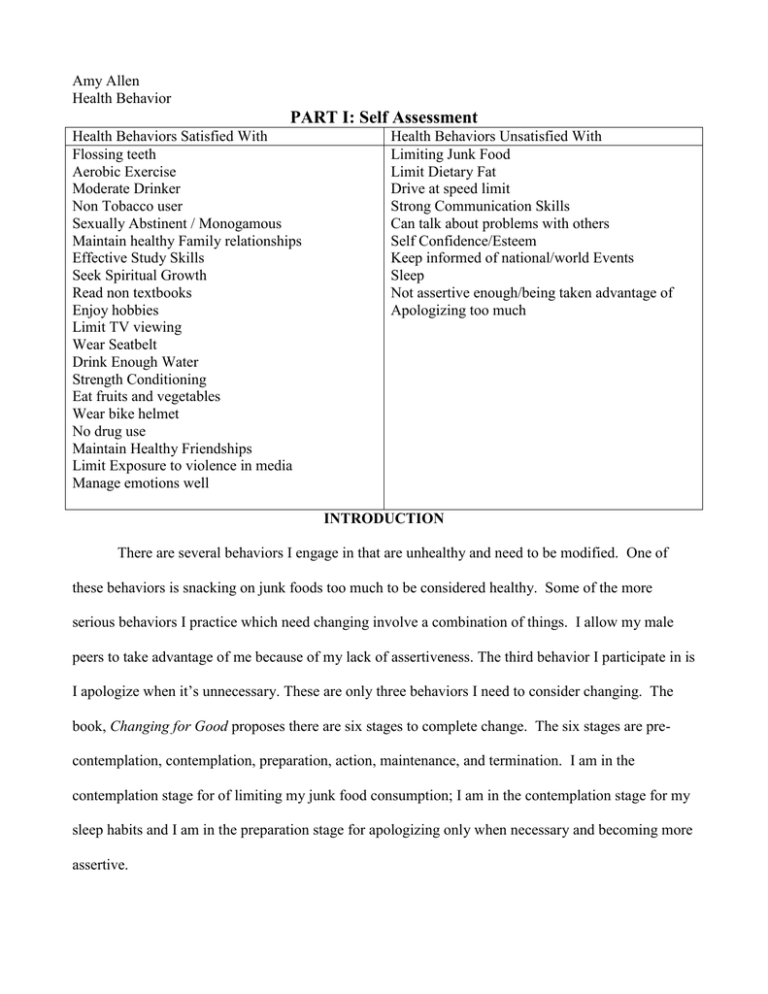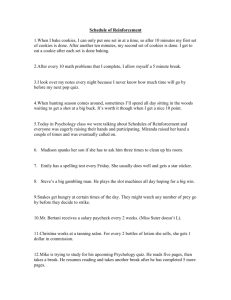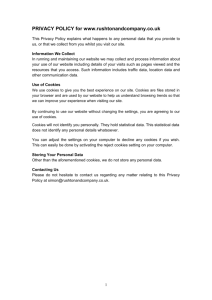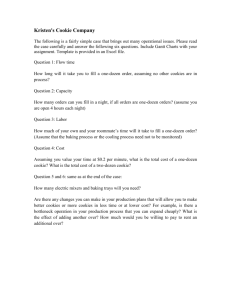Health Behavior Project
advertisement

Amy Allen Health Behavior PART I: Self Assessment Health Behaviors Satisfied With Flossing teeth Aerobic Exercise Moderate Drinker Non Tobacco user Sexually Abstinent / Monogamous Maintain healthy Family relationships Effective Study Skills Seek Spiritual Growth Read non textbooks Enjoy hobbies Limit TV viewing Wear Seatbelt Drink Enough Water Strength Conditioning Eat fruits and vegetables Wear bike helmet No drug use Maintain Healthy Friendships Limit Exposure to violence in media Manage emotions well Health Behaviors Unsatisfied With Limiting Junk Food Limit Dietary Fat Drive at speed limit Strong Communication Skills Can talk about problems with others Self Confidence/Esteem Keep informed of national/world Events Sleep Not assertive enough/being taken advantage of Apologizing too much INTRODUCTION There are several behaviors I engage in that are unhealthy and need to be modified. One of these behaviors is snacking on junk foods too much to be considered healthy. Some of the more serious behaviors I practice which need changing involve a combination of things. I allow my male peers to take advantage of me because of my lack of assertiveness. The third behavior I participate in is I apologize when it’s unnecessary. These are only three behaviors I need to consider changing. The book, Changing for Good proposes there are six stages to complete change. The six stages are precontemplation, contemplation, preparation, action, maintenance, and termination. I am in the contemplation stage for of limiting my junk food consumption; I am in the contemplation stage for my sleep habits and I am in the preparation stage for apologizing only when necessary and becoming more assertive. Behavior # 1: SNACKING ON TOO MANY COOKIES In the contemplation stage people acknowledge a problem begin to think about changing it. I definitely have a problem when it comes to snacks. Snacks that have less than 30% of calories from fat are considered acceptable. Many people recommend that three snacks should be consumed a day between meals. These snacks should be small and healthy such as fruit. When I come home from school, I’m starving and I find myself raiding the pantry. I engage in an unhealthy feast of food, particularly cookies. Cookies are my weakness. I have no self control when it comes to cookies. I am a cookie monster which is hazardous to my health considering there are no nutritional benefits from cookies. If there are cookies I will consume them and in large quantities. I know that an apple or banana is also a suitable and easy snack but they don’t seem to satisfy my hunger or craving like cookies do. If there aren’t cookies in the house, I will make cookies from scratch to satisfy my needs. I rationalize my cookie addiction because I always drink milk with my cookies. I can’t eat cookies without milk. I know I’m getting some type of nutrient when I eat cookies even though it’s not from the cookies themselves. I’ll eat cookies when I come home from school because I crave them during the day. When I’m driving home from school I look forward to eating cookies. When I come home from school, after not eating all day, I don’t feel like cooking “real” food because I’m hungry and it takes too long. This problem could be solved if I took the time to pack my lunch and snacks for school. Then, maybe when I came home I wouldn’t be starving and I would be more likely to spend the time to make a meal. Eating too many cookies is a habit I have had since elementary school. It needs to end because it’s unhealthy, and eventually, when I grow older my metabolism will slow down and I will get fat. Everyone has their favorite food to indulge in; mine is cookies. I would lose weight if I didn’t consume so many cookies. My best friend the other day said, “Amy, you know that 80% of your diet consists of cookies?” She was exaggerating, but because she pointed it out to me I realized that I really do have an unhealthy addiction to cookies. Other behaviors take priority over my indulging in cookies therefore I am still in the contemplation stage for this behavior. Behavior # 2: Apologizing too much The preparation stage can be described as when someone knows they have a problem and is willing to change. Apologizing too much is a serious problem. When I’m around men I feel inferior to them and seem to apologize a lot. If THEY step on MY foot I’ll apologize for being in the way. If I’m picking up a mess with a sponge that they made, I’ll apologize for taking too long. It’s a reflex and it has become so bad people even notice it. “What are you sorry for?” they ask. Just last week someone didn’t catch the pong ball, so I got it and threw it back to them, on it’s way it hit the ceiling. It still arrived at the right destination but I apologized for the balls detoured route. Apologizing so much must have to do with a lack of self confidence. It does happen around females but not nearly as often as it happens around men. I know I have a problem and have even tried to focus more on how much I say sorry to prevent me from saying it. I haven’t been too successful. It certainly isn’t logical to blame myself for everything. I’m in the preparation stage because I recognize the behavior and want to take the steps necessary to casually address it soon. I would like to pay more attention to how often the behavior happens. I think I apologize for everything because I always seem to be the scapegoat and I apologize out of habit. Even when I was younger and I didn’t do anything wrong my dad would blame me because I was the most convenient. If a light was left on in a room that no one was using or the computer froze when I happened to be on it, I always got blamed. If there was clutter sitting on the steps my dad would just assume it was mine and yell at me for it. him that it could possibly be my sister Allison’s belongings. It never occurred to When I hang out with other people, I don’t them to yell at me so I apologize for a lot of things before they get the opportunity to scold me. It doesn’t make sense to think that someone will get mad at me for doing silly things, but when I apologize it’s almost natural, like a reflex. Behavior # 3: Lack of Assertiveness with Male Peers Another behavior I engage in, related to apologizing too much, is not being assertive enough which allows my male peers to take advantage of me. If a guy needs another drink I’ll more than happily fill his cup up for him. If there is a spill across the room that I didn’t contribute to I will clean it up. If I walk into one of my friend’s apartment and their bathroom is dirty and they request that I clean it, and they beg, I will. One time I was at a party and my friend said, “Amy, my shoe is untied will you PLEASSE tie it for me.” After several minutes of persuasion I eventually got down on both hands and knees and tied his shoe for him. Someone even took a picture of it. I can’t think of anything more degrading. I thought to myself, “Why did I do that?” He is completely capable of tying his shoes. We learned how to tie shoes in elementary school. It’s not fair that he’s taking advantage of me. He knew I would say yes. There is no set expectation of this behavior in the book. I don’t think many people follow this behavior. I want to become more assertive. It’s hard now, I feel I’m expected to fill up peoples cups, clean up messes and do people favors. If I say no, it would feel mean or I would let people down. I like to engage in the behavior because I know it makes people slightly happy and allows them to be lazy; they don’t have to do anything because I will do it for them. I am in the preparation stage for this behavior. I am ready and willing to take the necessary steps to address this behavior. Discussion of behavior Chosen to Change While all three habits are serious and need to be taken care of, the one that most affects my life in a negative way is lacking assertiveness and allowing male peers to take advantage of me. Some things that contribute to my lack of assertiveness are my low self confidence in social situations and my inferiority complex toward men. For example if a man asks me to get them another drink, or clean off the counter, or make him food, I will because that’s what I believe a woman is supposed to do for a man. Mike, who takes advantage of me the most, is the one who notices the behavior the most. Mike plays Rowan Ice Hockey and I manage the team. I’m always around him because we travel to games on the bus together, and socialize after games together with the rest of the team. He occasionally calls me when he needs his apartment cleaned and then pays me a minimal amount to do it. Instead of saying yes, I should stand up for myself and request a higher payment or not perform the deed at all. Mike teases me about how I do everything for people all the time and let them take advantage of me. Once, he told me it’s annoying how I don’t stand up for myself. I don’t even have much of a problem with that, cleaning up after guys or making them meals, but I want them to respect me for it not take advantage of my kindness and lack of self confidence. This behavior is serious and if changed, would have the most positive benefit in my life. Counseling Support Conversations Session 1: As the counselor I felt awkward because I have never done formal counseling before. I was slightly uncomfortable being the counselor. I need to get used to waiting for replies and moments of silence. A couple times, I felt the urge to relate my experiences to Will’s, but I didn’t, feeling it was inappropriate. Being the client was difficult too, but not as hard as being the counselor. It was awkward opening up to Will at first. I find it difficult to open up to people that I do know, but to a stranger was more difficult. Will however, was excellent at making me feel comfortable and easy to talk to. I wanted advice from him though, which isn’t the role of a counselor. When our session was formally over “off the record” I asked him what he thought I could do to help with my behavior change. He made several suggestions that really helped me progress with my goals. Session 2: During the second session Will was a good listener. By the time we met a second time I had made so much progress in my goals I told will everything. Will asked me questions. I told him all my progress and he listened without interrupting and told me. The suggestions he had made worked well from the previous session. This session was easier to talk to Will. Will also progressed during the second session. He really understood that his procrastination was having a negative effect on his life and he talked about where it had originated from. I asked Will questions trying to get him to understand why he does procrastinate. I did better the second time, I didn’t have as many urges to tell him stories relating to my life and procrastinating. I listened to Will and asked him how he thought about suing a day planner. Session 3: During the third session, Will asked me questions about more progress I had made and we talked about them. I was so happy about my progress and Will took notice of this. He said he was happy for me that I had made such a difference in my behavior. When I spoke to Will as the counselor we talked about other strategies he could make to help him with his procrastination problems. I don’t feel like I did a very good job as a counselor because Will still seems to procrastinate a lot. I tried to encourage him to continue working at it and offered to help him if he needed me. Overall, Will was a much better counselor than me. PART II: Working within My Stage I am currently in the preparation stage and am ready to take action soon to help my behavior change occur. There are different processes recommended in the book to do, some of which seem helpful, others a nuisance because I don’t see how they would apply to my behavior change. One of the suggestions was to make a list of the benefits of my behavior changing. I’m more motivated to achieve those results because I can see them on a list. If I stop allowing my male peers to take a advantage of me and I stand up for myself people will: a.) RESPECT me more b.) Obviously won’t take advantage of me as much/see me as an equal c.) I’ll be more confident. d.) I’ll be able to develop more meaningful relationships with people. e.) I’ll feel better about myself. Turn away from old behavior I like the fact I make people happy because I do favors for them. However, it has gotten to the point where people know I will do favors for them, so they take advantage of the favors I do for them. I have no issue taking the necessary steps to fix this. For example, I offered to get someone a drink once, now they continually ask me to refill their glass. I offered to take someone’s coat to put it on the bed a couple weeks later they asked me to tie their shoe. I know it will be hard to change, but the outcome will be a positive one. Make change a Priority Changing is a priority on my list. Just last week someone dropped their phone and broke it so people began the “asshole’ chant. People do this when someone does something clumsy or ridiculous; it’s in a joking way. I bent down to pretend that I broke the phone and took the asshole chant for myself. That was the turning point and when I decided I needed to change. I said, “Wow, that’s little extreme; this needs to change.” Take Small Steps Taking small or baby steps is essential for achieving a goal. In my case, one of the small steps I’m going to take is simple. If someone asks me to fill their drink I’ll only fill it up if I need a drink too. There is no reason for me to make two trips to fill up drinks. Set a Date Setting a time frame is critical for a behavior change. I plan on taking some of the necessary steps to start changing my behavior change on Wednesday October 10th. Wednesday nights I usually hang out with lots of my friends particularly my male peers, so this would be an opportunity to start making small changes in my behavior. Go Public It is recommended to go public with behavior changes and yield support from friends and family. I don’t know that I am ready to do that. Perhaps I would mention to them that I am doing a project for class and the behavior change I chose is my male peers will no longer take advantage of me and I’ll stick up for myself but I would not bring the topic up randomly. Create your own plan of Action My behavior is measurable and I know when I do it. However, it will be slightly more difficult to find strategies to take it. I am a very anal person and like to make lists. Hopefully, writing some guidelines will aid me in following them. 1.) Try not to perform ridiculous or unnecessary activities. Examples of being ridiculously unnecessary activities are cleaning up a mess that I wasn’t responsible for that happened across the room, filling up someone’s glass, tying peoples shoes, cleaning someone’s bathroom, washing windows, walking to my car across campus to drive back to give someone a ride, cooking meals for guys and doing all the dishes. 2.) Don’t go out of my way to perform an activity. If something spills on the other side of the room I’ll let someone else clean it up. I won’t fill up someone’s cup unless I’m filling mine up too or are very nearby the kitchen. However if something spills nearby me I will most likely clean it up. 3.) Stand up for myself and say no. Often times one of the problems is that I am easily persuaded to do mom type things for people like cleaning, cooking, waiting on people etc. Part of this is probably because when my mom died I didn’t have anybody to do those things for me so I had to do them myself. I do them for other people in hopes that someday, someone will do them for me. Eventually, before the end of my behavior change project, I’d like to say no. It might not seem like a big deal to most people, but saying no will be a huge step in the process. When I can tell someone, “No. I won’t fill up your drink,” I know I will have made an improvement in my behavior and it will be an accomplishment. I think I will be able to focus best on this behavior change if I write about my experiences relating to my behavior. By writing in the logs, and talking to someone who will LISTEN, it will help me to successfully make an improvement in my behavior. Commitment of Self Assessment In order to take effective action an acceptable score for this assessment was fourteen. I scored a sixteen. I am completely committed to making this behavior change happen. It has been too long since I have stood up for myself and not allowed male peers to take advantage of me. I now have the time to set aside to focus on this issue because it is being guided through the classroom. I’m also excited to start making changes and practicing the rule I made for myself to see if there is a difference. Decisional Balance Few cons are present for my behavior change. My friends might not be happy or accepting at first with my new attitude. My behavior change will also be difficult and I’ll have to put a lot of time into it. The pros of my behavior change completely outweigh the cons. I know that I would be healthier if I change, people would eventually feel better about me if I change, I would be happier if I change, and people would respect me more if I change. I know in the whole picture everything will be better once I engage in the new behavior. Part III: Discussion During the beginning of my behavior change I was in preparation. I knew that I had a serious problem that needed to be changed and I was ready to take the necessary steps to achieve my goal. As soon as I wrote the first log I looked at it and thought that “Wow; I really am a mess and need help.” From that point I called some friends and had a few meaningful conversations. Will was also helpful during the counseling sessions. After reflecting on my first log I noticed how serious my behavior was and immediately started taking action. My action plan wasn’t as structured as I would have liked it to be. It was difficult to develop a plan because my behavior wasn’t even discussed in Changing for Good. A lot of my behavior change steps I had to experiment with and see what worked the best and what was most effective. I’m glad I didn’t participate in the original plan of tapering my habits. It was unrealistic and I would have gotten discouraged when I didn’t achieve my goal for the week. I tried to open up a lot in my logs to think about my actions better. The comments I received from them were also motivating. My friends noticed small changes too. I said no for the first time and they all made a big deal about it. ‘Stat Girl just said no. She never says no. What happened?” They also made several other comments throughout the six weeks that I also found encouraging. Changing my behavior wasn’t as difficult as I anticipated it would be. Although, I think my change would have been significantly more difficult had my friends not have been so supportive. Anytime someone made a positive comment about my behavior, I worked harder to improve at it because I saw the difference in the way they treated me and I liked it. They respect me more than ever and that means so much to me. Writing in the journal, talking to friends, and talking with Dr. Spencer were all effective ways that helped me reach my behavior goal. When I went to speak to a counselor, I wasn’t ready or enthusiastic about it. I wasn’t comfortable talking to them, or opening up during the session. As a result, it wasn’t very productive. Six weeks have passed in my behavior change goal. I went from the preparation stage to action stage in about a week and a half. I’m still in the action stage, and hopefully within the next six months I will progress to maintenance. I’m not perfect because occasionally, I still do some things that aren’t really necessary. However, I have improved a great deal and am continuing to work on making more progress. I’m so happy with the tremendous amount of progress I have made. Not only do I plan to continue practicing my new behavior, I also plan on working on another behavior. Hopefully the results will be just as awarding. Now that people don’t seem to take advantage of me as much I’d like to work on not apologizing as often.





